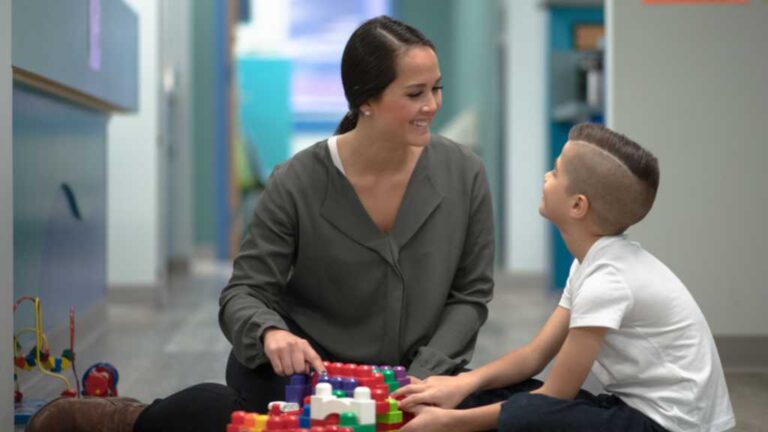ABA Centers of Florida understands that autism parents and guardians considering Applied Behavior Analysis (ABA) therapy for their child on the spectrum may wonder what happens during a typical ABA therapy session. So, we prepared this blog post to discuss what occurs in a regular ABA therapy session and what you, as a parent, can expect as the sessions progress. Additionally, we will explore the benefits of including this established therapy in your neurodivergent child’s regimen.
This blog will provide basic information about ABA therapy, like the typical session duration, areas of development covered, and a general breakdown of an average session. As an autism parent or guardian, being empowered and understanding how ABA therapy works upfront can help you and your (as we like to say) “neuro-delightful” child get the most out of this effective treatment.
A Frequent Question from Autism Parents: What Is ABA Therapy?
ABA therapy is a compassionate and science-based approach to understanding a child’s individualized behaviors. It helps those on the spectrum to acquire the meaningful skills needed to make vital strides toward more independent living. In a typical ABA therapy session, the focus will be on the child’s needs, in addition to the needs of the family.
ABA experts like Board Certified Behavior Analysts (BCBAs) and Registered Behavior Technicians (RBTs) utilize ABA practices to increase appropriate behaviors. These ABA practices include positively reinforcing actions that promote learning, participation, discovery, and play. Clients progress in many ways and achieve gains while having fun!
Not only is ABA therapy evidence-based, but it is also effective in reducing many of the challenges associated with autism. These include behaviors like aggression or elopement (wandering away), which can be dangerous. While the goal of ABA therapy is never to make a child “normal” or rote, ABA providers work hard to ensure clients learn to access real-world opportunities. ABA therapy helps individuals with autism live the vibrant life they deserve.
Additionally, ABA therapy sessions improve overall functioning in many essential areas of a neuro-determined (another preference over divergent) child’s life. This improvement strengthens a child’s ability to participate, learn and communicate in the way best for them.
Autism Parents Also Want to Know What a Typical ABA Therapy Session Covers
During ABA sessions, ABA providers typically employ a system of monitoring, measuring, applying, and assessing interventions designed to modify behavior. Typical ABA therapy sessions focus on developing skills related to social interaction, communication, daily living, school readiness, and academic development.
BCBAs determine session objectives and therapeutic goals through careful assessment of the individual’s current behavior and the outcomes of their actions. Providers may employ Discrete Trial Training (DTT) which involves repetition and reinforcement of target behaviors. They may also consider approaches like Natural Environment Teaching (NET) which promotes learning skills throughout everyday activities. Therapeutic strategies will range according to needs and environment.
Additionally, ABA therapy is a dynamic approach to replacing challenging behaviors with safer alternatives. For instance, if a child loves the feeling of falling from heights and engages in the behavior dangerously on the playground, their BCBA may work to replace the behavior. They may introduce the child to the conduct of jumping rope or on a trampoline. Modifying the behavior with a safer option allows the child to experience falling but keeps them safe.
How Can an Autism Parent Know Each ABA Therapy Session is Truly Individualized?
In Applied Behavior Analysis, the RBT and BCBA tailor every session to the person receiving services. This individualization significantly enhances the potential for successful skill acquisition and development. There is no umbrella approach to ABA treatment, and no two behavioral plans will ever look the same.
Your ABA providers will use structured strategies to identify specific areas where your child may benefit from additional support and reinforcement. Then a plan is tailored to the child’s individual needs that incorporate their passions and the things they find motivating.
Regardless of what the ABA therapy sessions consist of, ABA providers continuously strive to keep the environment engaging so your child can receive the best possible care at their own pace. ABA therapy proves, again and again, to be very effective in helping those with autism access what they need to flourish in their unique way!
How Long Is an ABA Therapy Session?
An ABA therapy session usually lasts 2-4 hours, but this can vary. It may include periods where treatment happens in a quiet setting with limited distractions. However, much of the ABA therapy session will occur within the child’s regular environment. Your RBT may attend school with your child, help them navigate extracurricular activities, or focus on learning critical tasks. Sessions happen several times weekly, and autism parents or caregivers are often involved in the therapy process.
ABA therapy adapts to the family’s needs and the child’s life demands. ABA therapy sessions provide a powerful tool to help individuals with autism learn and grow. Although they may seem like a commitment, the benefits can be incredible. Many families find having an RBT around can make life and daily commitments more manageable!
How Much Do the Sessions Vary?
Every ABA therapy session will be different. Variety happens because ABA works around and with your child’s evolving world. Suppose you’re preparing your child to experience new foods at a big family dinner. In that case, your BCBA and RBT will work hard to address core issues before the event to ensure success.
Suppose your child is nonspeaking or struggles with isolation. In that case, each session may involve a different routine that promotes interaction or rewards responsiveness. Overall, sessions will be designed around enhancing your child’s strengths, having positive experiences, and learning within their environment, naturally.
Will My Child Enjoy Their ABA Therapy Sessions?
For ABA therapy to be genuinely effective, sessions must be fun and highly motivating! While it is natural that a relationship between a therapist and a child takes time, your child should not dread their sessions. ABA therapy should become an expected part of your child’s daily routine. Additionally, time spent in ABA sessions can be beneficial for setting goals and building upon those successes. It’s an opportunity for growth, expansion, and celebration!
Ensuring that the child is enjoying therapy is exceptionally critical to the treatment process and something every good provider will keep at the forefront of their treatment plan. ABA therapy sessions will not be hours of drilling or endless lessons. Sessions will always include fun exchanges, child-directed play, and free time to regulate or decompress.
What Does a Typical ABA Therapy Session Involve?
An average ABA therapy session usually involves an experienced ABA therapist greeting their client and checking in on their day. Depending on the day’s needs, the RBT will begin the session and engage the client at their level and pace. RBTs will break down skills into manageable chunks, giving the learner a sense of accomplishment as they progress through the session.
ABA therapists typically divide time between direct instruction and teaching skills through role-playing or other activities. Additionally, RBTs will practice existing abilities to ensure they are maintained and continually reinforced. Over time, attending regular ABA therapy sessions builds healthy habits and fosters essential resilience throughout childhood and adulthood.
What Variables May Impact the Success of ABA Therapy?
The success of ABA therapy depends on several factors, such as the dedication of both the therapist and the patient’s family. Having a certified professional who understands autism and can develop a plan tailored to the child’s individual needs can make a huge difference. With exceptional guidance, consistency, and patience, ABA therapy can be invaluable for helping a child on the spectrum reach their fullest potential!
Is it Critical to Find the Right Providers?
The journey to success with ABA therapy can initially seem daunting, especially when navigating the challenges that your family may be experiencing. However, finding an experienced ABA provider who can offer personalized instruction tailored to your child’s needs is essential. Additionally, ensuring your ABA providers come from a regulated agency that offers ongoing training and support is a must.
A fantastic ABA provider understands the importance of supporting patients and their families throughout the entire ABA therapy process. They provide compassionate guidance while engaging clients in activities designed to help them reach their developmental milestones with tremendous success. With dedication, consistency, and patience, ABA therapy can be an invaluable resource for families affected by autism. Finding a provider you can trust is an integral step.
ABA Centers of Florida and Your Child
Ultimately, ABA therapy is about helping children reach their goals of becoming healthy and independent individuals. It is important to remember that while it may take time and a unique approach, progress is possible for every child on the spectrum. With commitment, support, and the help of incredibly experienced professionals, ABA therapy can bring about positive changes in behavior that lead to a brighter future for your entire family.
ABA Centers of Florida is passionate about delivering ABA services that completely transform lives. For more information about how we service incredible kiddos with autism throughout Florida, contact us at (772) 773-1975 to schedule a complimentary consultation or visit abacentersfl.com.








